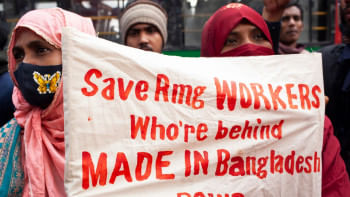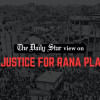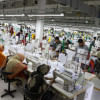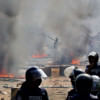What the Rana Plaza tragedy means in 2024

What does the April 2013 Rana Plaza event mean in April 2024? Putting images into words helps: a one-word takeaway being a tragedy; for two words, greed and growth; and with three, RMG, Rana Plaza, and reform. That's plenty already on the plate.
Stemming from one building in Savar, the tragic news fanned elsewhere quickly. This local event exposed lax national regulations and instantly rang the bells for many international buyers. Most talks on Bangladesh's economic progress ignore these images and issues, but fitting them into development agendas is imperative.
At the national level, Bangladesh is rightfully piqued with one of the world's highest growth rates in the 21st century. Peering beyond the Rana Plaza tragedy and looking towards national growth—in Bangladesh's case the global RMG industry, supply chain networks, or adjusting Bangladeshi governance against global standards—the question we're left with is: how does the decade-long Rana Plaza reform stew taste now? Let's visit this discussion on three levels of analysis on the local, national, and global scenarios and impacts.
Local
More than 1,100 workers perished in the Rana Plaza tragedy. Labelling their workplaces as factories exaggerates the notion of work needing no skills, paying low wages, and involving sedentary manual activities, typically a cut or two above handicraft or cottage industries. Such workplaces could be in towers, like Rana Plaza, but also in houses inside Dhaka and other towns, even in posh neighbourhoods such as Gulshan.
According to BGMEA data, just over 5,600 RMG plants in 2012-13 (the second highest ever, after 5,876 in the previous year) employed roughly 40 lakh workers (the highest ever), 58 percent of whom were women (declining from the 80 percent range in the 1980s). Today, a thousand or fewer plants recruit half a million more workers, with a reduced gender advantage for women, at a ratio of 53:47. RMG exports fetched $21.5 billion in 2012-13 (the highest until then), accounting for 79.61 percent of the country's net exports (the second highest ever ratio then). Today's $42.6 billion income represents 81.82 percent of total exports (partly because Rana Plaza reforms raised the proportions in 2015-16, 2017-18, 2018-19, and 2019-20). Government legislation made Tk 8,000 the minimum monthly wage in 2018 (roughly $1,200 annually), raised to Tk 12,500 monthly in December 2023 ($1,500 annually). To become a "developed country," Bangladesh needs a $13,845 per capita income. The RMG industry alone would not cut it.
Though economic development drives the country's growth, simultaneous political, social, and environmental development strengthens that growth. With the pandemic in 2020-22 lubricating automation, the Ukraine war fuelling price hikes, and the Red Sea skirmishes throttling supply lines, a low-wage RMG industry as the country's permanent fixture would be imprudent: new industries, new markets, and greater market competitiveness have been the sine qua non of growth. Only diversification, which is a costly, time-consuming engagement, can spawn new industries. And the Rana Plaza tragedy unwittingly sowed plenty of seeds for diversification.
Over time, the centre of garment manufacturing shifted from England in the mid-18th century to the United States, then to Latin American countries like Mexico and to South Korea after World War II. South Korea, which was then the world's poorest country, later inspired Bangladesh to join the garment industry after the Multi-Fibre Agreement (MFA) quota ended in 1974. Now, Bangladesh aims to leave the garment industry, as proven in the latest Vision 2041 document, as part of its long-term vision. Many African countries await the same pathway towards economic growth.
Despite the growth of RMG industries in various countries, Bangladesh hasn't seen tangible signs of social development from its RMG sector since 2013. Even as the 34th largest economy globally, the benefits of this growth have reached citizens selectively, leading to a rigid economy rather than a flexible one.
National
The Rana Plaza tragedy prompted a positive outcome—it expanded non-entrepreneurial intra-industry influence. Beyond just improving factory conditions and regulations, three key strategies had thrust growth: subscribing to plant-specific LEED standards; embracing Vision 2031; and fully embracing Vision 2041. Achieving sustainable growth and diversification is crucial. Development must ultimately blend national and local reforms with international norms.
In terms of SDGs, Bangladesh has achieved 30.9 percent of net targets by today, made limited progress at 41.2 percent, and continues aggravating 27.9 percent. Ranking 101st out of 166 countries, its 65.9 SDG index score for 2023 suggests that it is either marginally "ahead" in the SDG race or marginally "behind." Bangladesh is ahead if we compare to 2013 (when no standards had prevailed), and behind because obstacles have relentlessly increased—with urban congestion stifling production, and water pollution corroding health while breeding diseases. Our SDG status mirrors our RMG fate.
Vision 2041 invisibly and abstractly promotes the idea that Bangladesh is moving ahead partly because development has a symbiotic relationship with industrialisation. RMG drove the first industrial revolution, with landless rural denizens supplying the needed manual low-skilled labour. Vision 2041 shifts workers from high mass-production goals towards high-mass consumption goals.
Shifting from physical to intellectual input means wages become salaries, blue collars become white collars, and manufacturing transits into infinite services. The Ukraine war and Red Sea crisis have sparked increased interest in renewable fuel sources and alternative supply chains. However, they have also inadvertently revived nationalised policies and local transactions. This has prompted searches for regional economic integration, indicating a growing need for supporting RMG export replacements. Diversification is key, especially since Bangladesh's neighbours also export RMG products. Automation has reduced the dependence on low-wage labour, but diversifying manual labour through training and education is crucial. This can help upgrade the RMG business, expanding from traditional Main Street styles to haute couture or fast-fashion segments.
Global
The Leadership in Energy and Environmental Design (LEED) campaign, initiated by the US Green Building Council (USGBC), predates the Rana Plaza tragedy. Its aim was to inspire foreign brands, marketers, and retailers to adopt environmentally friendly practices. Two Bangladeshi firms received the first LEED certification in 2011. By 2024, the number of certified firms has risen to 207, largely due to reforms following the Rana Plaza disaster.
Following the disaster, European interests, which consume a significant portion of Bangladesh's RMG exports, formed the Accord, while their US counterparts, representing Bangladesh's largest RMG market, formed the Alliance. The Alliance is non-binding, reflecting a purely neoliberal free-for-all marketing approach. In contrast, the Accord is more binding, with stricter checks and balances for factory conditions. Ultimately, the Accord's emphasis on "green" LEED standards proved more effective.
LEED measures seven dimensions and distributes 110 points: site sustainability (which gets 26 points), water efficiency (10), energy and atmosphere (35), materials and resources (14), indoor environment utility (15), innovations (6), and regional priority credits (4). Firms with 80+ points receive a platinum certification, those with 60-79 gold, 50-59 silver, and 40-49 a simple certificate. By 2024, Bangladeshi firms received a global-leading 77 platinum (second-placed China got 10, Pakistan nine, India and Sri Lanka six each, and Thailand and Vietnam four), 116 gold, 10 silver, and four simple certifications. Thirteen other RMG plants won the LEED Green Factory award created by BGMEA-USGBC collaboration. With 90 percent of the world's top green garment factories operating in Bangladesh, the country's RMG sector can cautiously smile.
To conclude, intertwining wins. It makes local-national-international connections necessary for growth, and private-public investments a sufficient catalyst. The latter accents non-zero-sum outcomes. Emphasising these connections encourages the abandonment of harmful practices like ship-breaking and child labour, while promoting environmentally friendly initiatives such as ship-recycling. Three-quarters of our "plan B" industry, steel, can be found in this shift, giving us a cleaner start for our own second industrial revolution. Our half-hearted smiles could then widen, as greed succumbs to qualitative growth.
Dr Imtiaz A Hussain is professor and founder of the Department of Global Studies and Governance at Independent University, Bangladesh (IUB).
Views expressed in this article are the author's own.
Follow The Daily Star Opinion on Facebook for the latest opinions, commentaries and analyses by experts and professionals. To contribute your article or letter to The Daily Star Opinion, see our guidelines for submission.


 For all latest news, follow The Daily Star's Google News channel.
For all latest news, follow The Daily Star's Google News channel. 













Comments